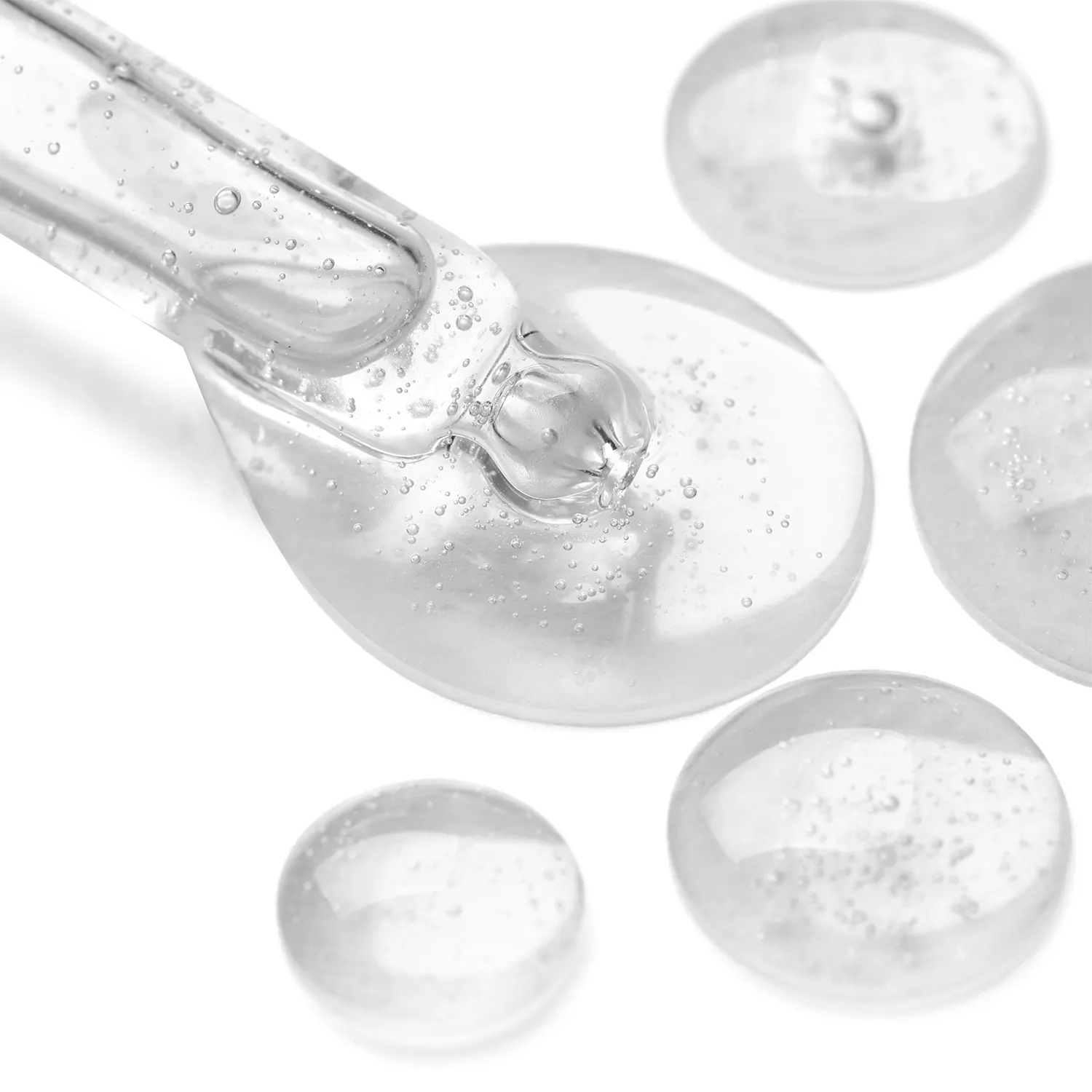
How does hyaluronic acid work in the skin?

Hyaluronic acid regenerates the tissue, tightens and keeps the skin elastic. Hardly any other cosmetic ingredient is able to moisturize the skin as effectively as hyaluronic acid: 1 gram of hyaluronic acid can bind up to 6 liters of water. The individual hyaluronic acid molecules in the skin suck in the water like little magnets and can store it. Studies have found that hyaluronic acid also stimulates the fibroblasts in the lower layers of the skin. Hyaluronic acid also stimulates the formation of new collagen and elastin and supports the development of a stable skin structure.
What is hyaluronic acid?
Hyaluronic acid (INCI names: Sodium Hyaluronate, Hyaluronic Acid or Hydrolyzed Sodium Hyaluronate) is a natural compound produced by the body. From a chemical point of view, hyaluronic acid is a polysaccharide. The name hyaluronic acid is derived from the Greek word hyalos = glass and the component glucuronic acid. Hyaluronic acid has little to do with the usual properties of an acid, because hyaluronic acid is neither acidic nor irritating to the skin. The connective tissue cells of the subcutaneous tissue produce the hyaluronic acid themselves. The gel-like substance is stored between the epidermis (top layer of skin) and the underlying dermis (leather skin) as part of the connective tissue.
How is hyaluronic acid produced?
In the past, hyaluronic acid was extracted from animal materials such as rooster combs. The animal protein contained in these products caused increased allergies. Today, biotechnologically produced hyaluronic acid is used, which is extremely skin-friendly. Allergies or intolerances to hyaluronic acid are therefore practically non-existent.
Where does hyaluronic acid occur in our body?
Hyaluronic acid is a main component of synovial fluid (synovia). It serves as a lubricant to keep the joints supple and to protect the articular cartilage. Hyaluronic acid also forms the basic structure of the cartilage. Without hyaluronic acid, no firm and stable cartilage is possible. Hyaluronic acid also demonstrates its impressive water-binding properties in the human eye: the vitreous body of the eye consists of 98% water, which is bound by only 2% hyaluronic acid. Hyaluronic acid is therefore a key active ingredient in eye drops for moisturizing dry, irritated eyes, such as those that can occur when working at a computer screen or wearing contact lenses.
How does a deficiency of hyaluronic acid occur?
Unfortunately, the amount of hyaluronic acid in the body naturally decreases over the years. While the hyaluronic acid content of the skin is 0.33% at the age of 20, it is only 0.007% at the age of 70, thus decreasing by 98% with age. The result is dry, rough skin with reduced firmness, elasticity and increased wrinkle formation. Hyaluronic acid successfully counteracts precisely these signs of aging in skin care. If the skin is regularly supplied with additional hyaluronic acid over a longer period of time, it fills up again and wrinkles are reduced.
Which skin is hyaluronic acid suitable for?
Regardless of whether you have very sensitive, dry, mature or blemish-prone skin: Hyaluronic acid is suitable for every skin type. Dehydrated, dry skin with a weakened skin barrier can particularly benefit from hyaluronic acid. A facial serum with a high dose of hyaluronic acid is therefore a sensible basic care product when it comes to delaying the skin's aging process and keeping the skin wrinkle-free, firm and youthful for as long as possible.
What effect do the different molecular sizes of hyaluronic acid have?

Hyaluronic acid in cosmetics is not always the same. In principle, a distinction is made between high molecular weight and low molecular weight hyaluronic acid with different molecular weights. The molecular sizes are measured in the atomic mass unit kDA (= kilodalton; 1 kDa = 1000 Da = Dalton).
-
High molecular weight hyaluronic acid (INCI: Sodium Hyaluronate)
High molecular or long-chain hyaluronic acid remains on the surface of the skin. Due to its molecular size, it cannot penetrate the skin and has an immediate effect, but only in the short term. High molecular hyaluronic acid has film-forming properties. It protects against moisture loss, inhibits inflammation and temporarily plumps up fine lines and wrinkles. High molecular hyaluronic acid usually has a molecular size of 1500 kD and larger. -
Low molecular weight hyaluronic acid (INCI: Sodium Hyaluronate)
Low molecular weight or short-chain hyaluronic acid is able to penetrate deeper into the skin and bind moisture there for a long time. This makes the skin appear firmer and small wrinkles are plumped up. The body's own collagen production is stimulated. Low molecular weight hyaluronic acid usually has a molecular size of 50 kD and smaller. Low molecular weight hyaluronic acid is usually used in higher-priced products because it is comparatively expensive. -
Oligo- or ultra-low molecular weight hyaluronic acid (INCI: Sodium Hyaluronate)
Ultra-low molecular weight or oligo-hyaluronic acid has a molecular mass of 3kD and less. This innovative variant of an extremely short-chain hyaluronic acid is stored in the connective tissue of the skin. It has the ability to penetrate particularly deeply into the skin. It strengthens the tissue and tightens the skin structure sustainably. The body's own collagen and elastin production is stimulated. Oligo-hyaluronic acid is very expensive.
What is the ideal hyaluronic acid concentration in a facial serum?
Many manufacturers of cosmetic hyaluronic acid serums advertise concentrations of 10% or more. However, this is a mixture of hyaluronic acid and water, although the actual hyaluronic acid concentration is only 0.1% - 0.2%. The ideal dosage for an effective hyaluronic booster serum is 1% pure hyaluronic acid. The largest proportion should consist of ultra-low molecular weight or oligo-hyaluronic acid. Products with even higher hyaluronic acid contents, especially high molecular weight hyaluronic acid, give the skin an unpleasant feeling. They have a slightly sticky effect on the skin and can roll off or form small rolls when combined with other facial care products.
The myrto Hyaluron Serum 300 contains 1% pure hyaluronic acid in its most concentrated form. The serum consists of high, low and oligo-molecular hyaluronic acids that penetrate deep into the skin and provide intensive moisture supply and storage with a depot effect. All other myrto facial serums contain 0.3 - 0.4% pure hyaluronic acid in addition to their specific combination of active ingredients for the various skin needs.
What should be taken into account when using it?
Apply the hyaluronic serum directly after cleansing and toning, before applying another serum with lipids or a moisturizer. Patting the serum in allows for better absorption of the active ingredients. Then use your usual myrto care products. The hyaluronic serum is ideal for daily use.
Conclusion
Hyaluronic acid, as a skin-identical ingredient, is actually one of the best ways to moisturize the skin, especially when combined with different molecular sizes. We can successfully counteract the decreasing hyaluronic acid content of our skin over the years with the help of a highly concentrated facial serum. However, you should never use an oil-free, high-dose hyaluronic serum as the only skin care product, so that the bound water does not immediately evaporate from your skin and make the skin feel uncomfortably tight. A moisturizing face cream or facial oil over a high-dose hyaluronic serum is therefore a must. This locks in the moisture and protects your skin from drying out.




